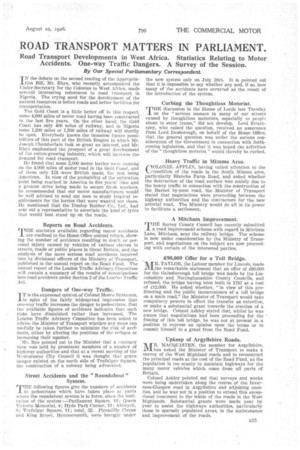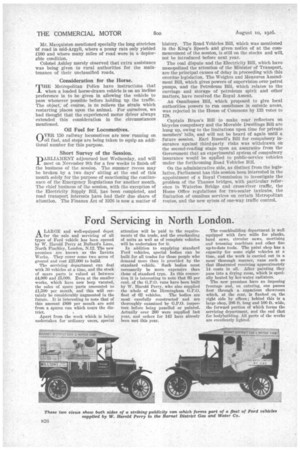ROAD TRANSPORT MATTERS IN PARLIAMENT.
Page 9

Page 10

If you've noticed an error in this article please click here to report it so we can fix it.
Road Transport Developments in West Africa. Statistics Relating to Motor Accidents. One-way Traffic Dangers. A Survey of the Session.
By Our Special Parliamentary Correspondent.
IN the debate on the second reading of the Appropriation Bill, Mr. Rhys, who recently accompanied the Under-Secretary for the Colonies to West Africa, made several interesting references to road transport in Nigeria. The crying need for the development of the natural resources is better roads and better facilities for transportation.
The Gold Coast is a little better off in this respect, some 4,000 miles of motor road having been constructed in the last five years. On the other hand, the Gold Coast has only 400 miles of railway, and in Nigeria some 1,200 miles or 1,300 miles of railway will shortly be open. Everybody knows the immense future possibilities of this part of the British Empire in which Mr. Joseph Chamberlain took so great an interest, and IVIr. Rhys emphasized the prospect of a great development of the cotton-growing industry, which will increase the demand for road transport.
He found that some 2,000 motor lorries were running on the 4,000 miles of motor road in the Gold Coast, and of these only 123 were British made, the rest being American.In view of the probability of the saturation point being reached in America in five years' time and a greater drive being made to secure fresh markets, he recommended that our motor manufacturers would be well advised to send out men to study tropical requirements for the lorries that were wanted out there. He mentioned that the Dunlop Rubber Co., Ltd., had sent out a representative to ascertain the kind of tyres that would best. stand 'up on the roads.
Reports on Road Accidents.
T"statistics available. regarding motor accidents are confined to the Home Office annual return, showing the number of accidents resulting in death or personal injury caused by vehicles of various classes in streets, roads or public places in Great Britain, and the analysis of the more serious road accidents inquired, into by•divisional officers of the Ministry of Transport, published in the annual report on the.Road Fund. The annual report of the London Traffic Advisory Committee will contain a summary of the results of investigations into road accidents under Section 2 of the Lonsion Traffic Act.
Dangers of One-way Traffic.
IT is the expressed opinion of Colonel Moore-Brabazon; in spite of the fairly widespread impression that one-way traffic increases the danger to pedestrians, that the available figures. of accidents indicates that such risks have diminished rather than increased. The London Traffic -Advisory Committee has been asked to advise the Minister of Transport whether any steps can usefully be taken further to minimize the risk of accidents, either by altering the positions of the refuges or increasing their number.
Mr. Rye pointed out to the Minister that a contrary view was held by prominent.merabers of a number of highway authorities and that at aS recent meeting of the Westminster City Council it was thought that grave danger existed on the north side of Trafalgar Square, the construction of a subway being advocated.
Street Accidents and the " Roundabout " System.
THE following figures give the numbers of accidents • to pedestrians. which have taken place at parts where the roundabout system is in force, since the institution of the system :—Parliament Square. 16: Queen Vitoria Memorial, 4; Hyde Park Corner, 13: Aldwych, S ; Trafalgar Square, 11; total, 52. Piccadilly Circus and King Street, Hammersmith, were brought under
the new system only on July 26th. It is pointed out that it is impossible to say whether any and, if so, how many of the accidents have occurred as the result of the introduction of the system.
Curbing the Thoughtless Motorist.
THEdiscussion in the House of Lords last Tuesday on the "serious menace in many of our streets caused by thoughtless motorists, especially to people about to enter trains," did not develop. Lord Strathspey, who raised the question, received an assurance from Lord Desborough, on behalf of the Home Office, that the general question was under the serious consideration of the Government in connection with forthcoming legislation, and that it was hoped the activities of the "thoughtless motorist" would thereby be curbed.
Heavy Traffic in Mimms Area.
COLONEL APPLIN, having called attention to the V./condition of the roads in the South Mimms area, particularly Blanche Farm Road, and asked whether the destruction of the road surface was mainly due to the heavy traffic in connection with the construction of the Barnet by-pass road, the Minister of Transport stated that negotiations Were proceeding between the highway authorities and the contractors for the new arterial road. The Ministry would do all in its power to facilitate a settlement.
A Mitcham Improvement.
T"Surrey County Council has recently submitted a road improvement scheme with regard to Mitcham Lane, Mitcham, near the railway bridge. The scheme is now under consideration by the Ministry of Transport, and negotiations on the subject are now proceeding with certain of the interested parties.
E90,000 Offer for a Toll Bridge. TAYLOR, the Labour member for Lincoln, made .1.11_the remarkable statement that an offer of £90,000 for the Gainsborough toll bridge was made by the Lincolnshire and Nottinghamshire County Councils, and refused, the bridge having been built in 1787 at a cost of £12,000. He asked whether, "in view of this profiteering and the public inconvenience of a toll bridge on a main road," the Minister of Transport would take compulsory powers to effect the transfer as extortion, or make a substantial grant towards the erection of a new bridge. Colonel Ashley stated that, whilst he was aware that negotiations had been proceeding for the ' freeing of this toll bridge, he was not at present in a position to express an opinion upon the terms or to commit himself to a grant from the Road Fund.
Upkeep of Argyllshire Roads.
MACQUISTEN, the member for Argyllshire, 111has asked the Minister of Transport to make a survey of the West Highland roads and to reconstruct the principal roads at the cost of the Road Fund, as the population is too scanty to maintain highways for the many motor vehicles which come from all parts of Britain.
Colonel Ashley pointed out that surveys and works were being undertaken along the course of the Inverness-Glasgow road in Argyllshire and adjoining counties, and he was not in a position to extend this exceptional treatment to the whisle of the roads in the West Highlands. Substantial grants were made year by year to assist the highways authorities, particularly those in sparsely populated areas, in the maintenance and improvement of the roads. Mr. Macquisten mentioned specially the long stretches of road in mid-Argyll, where a penny rate only yielded £160 and where many miles of road were in a deplorable condition.
Colonel Ashley merely observed that extra assistance was being given to rural authorities for the maintenance of their unclassified roads.
Consideration for the Horse.
THE Metropolitan Police have instructions that when a loaded horse-drawn vehicle is on an incline preference is to be given in allowing the vehicle to pass whenever possible before holding up the traffic.. The object, of course, is to relieve the strain which restarting places upon the animal. For ourselves, we had thought that the experienced motor driver always extended this consideration in the circumstances mentioned.
Oil Fuel for Locomotives.
OVER 150 railway locomotives are now running on oil fuel, and steps are being taken to equip an additional number for this purpose.
Short Survey of the Session.
ARLIAMENT adjourned last Wednesday, and will meet on November 9th for a few weeks to finish off the business of the session. The summer recess may be broken by a two days' sitting at the end of this month solely for the purpose of sanctioning the continuance of the Emergency Regulations for another month. The chief business of the session, with the exception of the Electricity Supply Bill, has been completed, and road transport interests have had their due share of attention. The Finance Act of 1926 is now a matter of history. The Road Vehicles Bill, which was mentioned in the King's Speech and given notice of at the commencement of the session, is still on the stocks and will, not be introduced before next year.
The coal dispute and the Electricity Bill, which have monopolized the attention of the Minister of Transport, are the principal causes of delay in proceeding with this overdue legislation. The Weights and Measures Amendment Bill, which gives powers of supervision over petrol pumps, and the Petroleum Bill, which relates to the carriage and storage of petroleum spirit and other matters, have received the Royal Assent.
An Omnibuses Bill, which proposed to give local authorities powers to run omnibuses in outside areas, was rejected in the House of Commons by 133 votes to 128.
Captain Brass's Bill to make rear reflectors on bicycles compulsory and the Movable Dwellings Bill are hung up, owing to the limitations upon time for private members' bills, and will not be heard of again until a future session. Earl Russell's Bill for compulsory insurance against third-party risks was withdrawn on the second-reading stage upon an assurance from the Government that. an experimental system of compulsory insurance would be applied to public-service vehicles under the forthcoming Road Vehicles Bill.
On the administrative side, as distinct from the legislative, Parliament has this session been interested in the appointment of a Royal Commission to investigate the problem of the Thames bridges, with particular reference to Waterloo Bridge and , cross-river traffic, the Home Office regulations for two-seater taxicabs, the limitation of omnibus services on certain Metropolitan routes, and the new sytem of one-way traffic control,




























